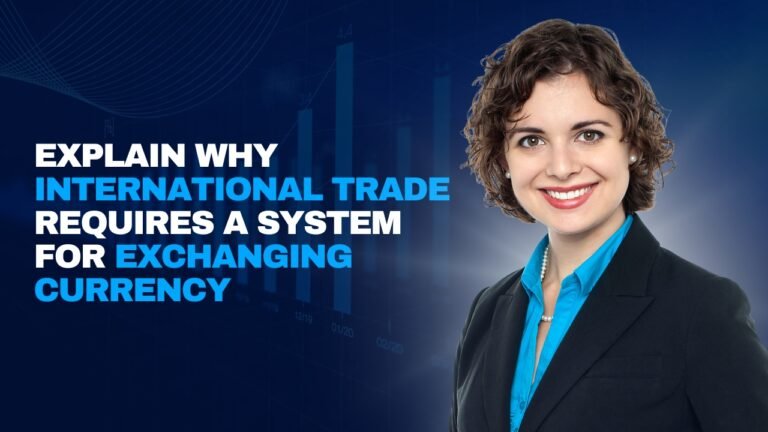Explain Why International Trade Requires A System For Exchanging Currency
Discover why currency exchange systems are crucial for global trade. Learn how they impact imports, exports, and the world economy in simple terms.
Table of Contents
What Is Currency Exchange in Global Trade?
Currency exchange in international trade refers to the process of exchanging the money of one country with that of another country to purchase or sell goods and services across borders. Countries have different currencies, such as the US dollar (USD), the euro (EUR), or the Japanese yen (JPY), so a mechanism is required to facilitate cross-border payments.
When a firm in one nation wishes to import products in another nation, it is not able to pay using its domestic currency. Rather, it has to trade its money for the currency of the seller. This is known as foreign exchange, or forex, and it facilitates the smooth occurrence of global trade.
The exchange rate indicates the value of one currency in relation to another. These rates are dynamic and are always fluctuating because of market demand, inflation, interest rates and economic conditions. These transactions are carried out in the foreign exchange market (forex market) and ensure that trade continues between nations.
In the absence of a currency exchange system, companies would find it difficult to price products reasonably or pay across borders. International trade is what makes currency exchange fast, balanced, and reliable, which is why it is a necessity in the modern global economy.
Why Countries Don’t Use One Currency
The question that many people ask is why the world does not trade in one currency. This is because each nation has its own economy, policies and financial requirements. The multiple currencies allow each nation to regulate its money supply, interest rates, and inflation.
The idea of a global currency might seem convenient, but it can create more issues than it resolves. Nations possess varying degrees of economic power. There are those with rapidly developing economies and those with slow growth or inflation. A single currency would imply that all countries would be governed by the same rules- even when their circumstances are different.
As an illustration, in case there was only one currency in the world, a poor economy would have to comply with the interest rate policies of the stronger economies. This may result in loss of jobs, increased prices or reduced exports in certain countries. It would also remove the authority of central banks to control local economies.
This brings us to the broader concept of why might countries want to trade with each other. Trading in different currencies enables every nation to trade internationally without losing control of its local economy. International transactions can occur without any problems, even when there are numerous currencies in circulation with a good currency exchange system.
Concisely, a single currency is not feasible. The currency exchange system maintains international trade to be fair, flexible, and efficient.
How Exchange Rates Work in International Trade
In the case of two countries trading, they tend to use different currencies. In order to make the transaction, one currency has to be exchanged with another. This exchange is pegged on what is known as the exchange rate- the value of one currency relative to another.
What Is an Exchange Rate?
An exchange rate informs you of the value of one currency in another. As an example, when 1 US dollar is worth 0.90 euros, then the exchange rate between USD and EUR is 0.90. These rates are not constant; they vary daily depending on the situation in the world market.
Determine the index to trade
The exchange rates are affected by several factors:
- Currency supply and demand
- Central bank interest rates
- Inflation levels
- Stability in politics and the economy
- Trends in the global market
A strong economy in a country tends to make the currency more valuable. This increases the cost of its exports and reduces the cost of imports. On the other hand, a devalued currency may be applied to boost exports and also make imports costly.
Why Exchange Rates Matter in Trade
The cost of international trade is directly affected by the exchange rates. When the rate is favourable, it makes it cheaper to purchase goods in another country. When the rate is high, imports can be costly, and this can impact the profits of businesses.
Simply put, exchange rates are a major determinant of the cost of cross-border business. This is why a stable currency exchange system is necessary to ensure a fair and smooth global trade.
7 Reasons Why Currency Exchange Is Essential in Global Trade
A robust currency exchange mechanism maintains the smooth flow of trade in the world. It assists nations that use different currencies to exchange goods and services conveniently. These are seven of the most important reasons why it is so important in international business:
1. Enables Cross-Border Payments
In international trade, buyers and sellers are in different countries, and they use different currencies. Currency exchange enables both parties to pay or receive payments in their local currency. This makes it possible to trade even when the currencies are not the same.
2. Ensures Fair Pricing
The conversion of currencies helps businesses to get the right and reasonable prices of goods and services. Without it, there would be no meaning to be made of price comparisons between countries. To be open and trustworthy, global pricing is done through the exchange rates.
3. Protects Against Currency Fluctuations
Currencies fluctuate in value daily. An adequate exchange system assists traders in dealing with this risk. It allows them to set prices or insure against future losses because of the rate changes.
4. Boosts Economic Growth
Exchange of currency facilitates the exportation of goods and foreign investment by countries. This attracts more money, employment and builds the economy in the long run. Trade is an engine of growth.

5. Maintains Balance in Trade Deals
The exchange rates are flexible according to the market forces, and this makes trade more balanced. When the currency of one country is too strong or too weak, the exchange rate balances it. This prevents unequal trade benefits.
6. Builds Trust in Global Business
Businesses are more comfortable trading across borders when they are aware that they can easily convert money. A sound currency exchange system reduces the risks of payment and encourages long-term international relations
7. Supports Global Financial Systems
The forex market links the local markets with the world economy through the exchange of currencies. It helps the central banks to control the amount of money in circulation, control inflation, and stabilise interest rates, which are key tools in the existence of healthy financial systems.
Real-Life Examples: Currency Exchange in Action
Now, how does currency exchange occur in actual international trade scenarios?
Take the example of a German clothing company that wants to buy cotton in Brazil. The German firm operates on euros (EUR), whereas the Brazilian supplier prefers to be paid in Brazilian reais (BRL). The buyer will have to convert euros to reals at the prevailing exchange rate to seal the deal.
In a different scenario, a Japanese electronics brand sells laptops to the United States. The U.S. buyer will be using U.S dollars (USD,) but the Japanese company needs Japanese yen (JPY) to pay its employees and suppliers. The foreign exchange market converts the USD into yen, which makes the transaction possible.
These illustrations demonstrate that companies rely on currency exchange to conduct international trade. In its absence, payments would be hard or even impossible. A stable currency exchange system will make sure that buyers and sellers can transact business without any hitch-regardless of their location in the globe.
What Happens Without a Currency Exchange System?
International trade would be in trouble without an effective currency exchange system. Due to the difference in currencies, countries would not be able to pay one another easily. This would slow down or halt international transactions.
Companies would find it difficult to sell products at fair prices internationally. The currency of one country may be too strong or too weak, which may cause confusion, unfair transactions, or even losses. It may also establish black markets where illegal money exchange occurs at dangerous or illegal rates.
In the absence of currency conversion, firms may not trade across borders. This would restrict the availability of foreign goods, decrease competition and retard economic growth. The most affected would be the smaller businesses, which depend on stable systems to facilitate cross-border payments.
Concisely, the absence or failure of a foreign exchange system would derail international supply chains and negatively affect international trade. This is why a stable and transparent currency exchange market is not only useful, but it is a necessity in the modern global economy.
Conclusion
International trade needs a stable currency exchange system. It guarantees reasonable prices, safe payments, and equal international trade. In its absence, companies and economies would find it difficult to expand and interrelate.
At Beirman Capital, we assist traders to learn how currency movements affect global trade and investment.
Want to read more or get professional trading tips?
Contact us now and be ahead of the game in the forex and international markets.
FAQs
1. Why does international trade require exchanging currencies?
Currency exchange is required in international trade since nations have different currencies. Traders exchange one currency for another to pay for and compare the value of goods to buy or sell.
2. Why do we need a system for exchanging one currency for another?
We require a currency exchange system whereby businesses and individuals can trade across borders with ease. It assists in the exchange of money between different currencies to facilitate payments.
3. Why is foreign currency exchange needed?
The exchange of foreign currencies is required due to the fact that various countries have different currencies. It enables individuals and companies to trade, travel and invest across borders by exchanging money across currencies.
4. Why is the foreign exchange rate system important?
The foreign exchange rate system assists in the determination of the value of one currency against another. It renders international trade, travel and investment fair and efficient.
3. Why is currency important in trade?
In trade, currency is important because it is a universal medium of exchange. It assists buyers and sellers in reaching an agreement on prices and makes transactions easy across borders.
4. Why is foreign currency exchange needed?
Exchange of foreign currency is required to change money of one country to another. This enables companies and individuals to purchase, sell and invest across borders without the hindrance of currency.
5. Why is international trade required?
International trade is necessitated by the fact that no nation can produce all that it requires. Trading enables countries to get access to goods and services that they are not producing, which improves decision-making and economic growth.
Get Complete Forex Trading Assistance


